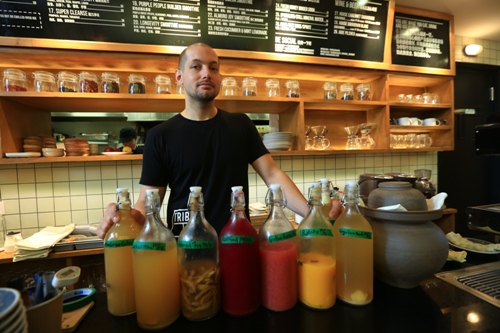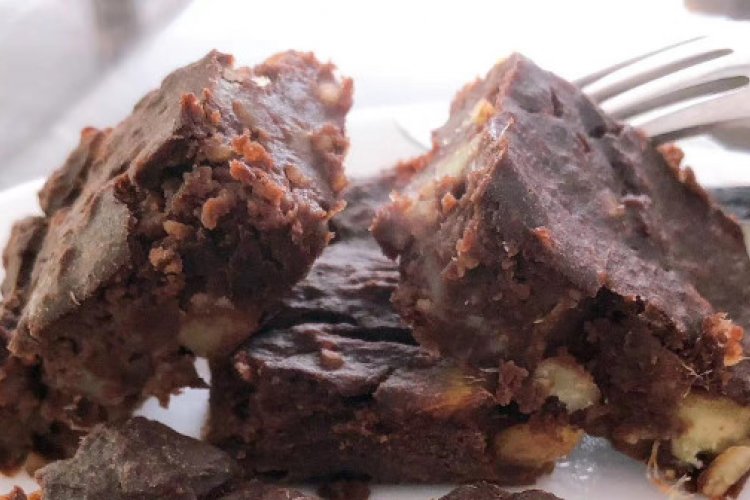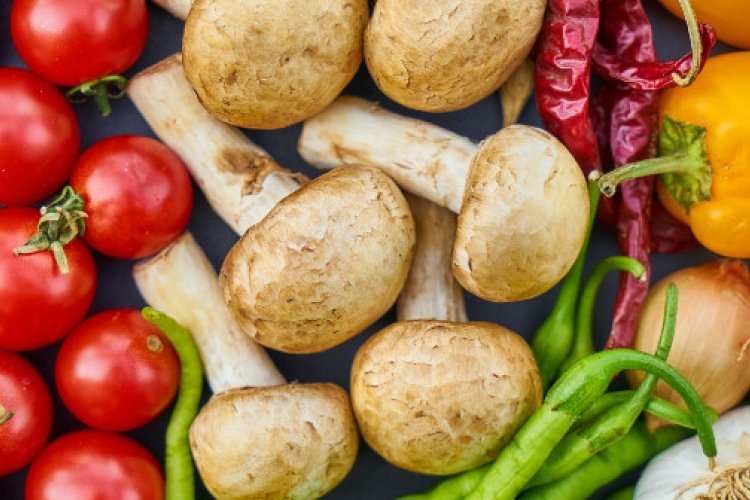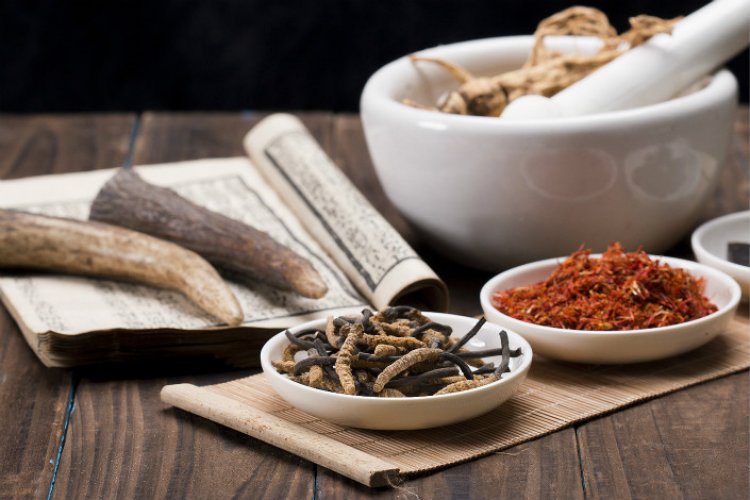Gut Feeling: Kombucha Does the Body Good
 This blog series is sponsored by Tribe Organic Restaurant, Beijing's newest option for fresh, healthy, organic and vegetarian-friendly dining.
This blog series is sponsored by Tribe Organic Restaurant, Beijing's newest option for fresh, healthy, organic and vegetarian-friendly dining.
Head splitting hangovers, bouts of heartburn, or the side effects of other guilty pleasures make most of us long for a wholesome detox. In the West, a growing trend to remedy such gut rotting gluttony is a glass of kombucha, a fermented beverage that aids in digestion. But while Brandon Trowbridge is very much a kombucha enthusiast, he disagrees with guzzling it after one’s over indulgences.
“Some people will drink a lot of kombucha to really detox, but that just reminds me of a ‘Hollywood diet’ that only cleans you out,” Trowbridge, the chef at Tribe (a health food eatery on Gongti Donglu) says of the recent Western fad of binging on the fermented beverage. Instead, he recommends drinking a moderate 16ml (or shot glass sized) portion of kombucha three times a day, after every meal like a digestif, and making the drink part of one’s daily routine, as opposed to treating it like an occasional miracle cure. “It depends on what you want, I suppose. Some people want a big detox, but I believe in trying to always be healthy so that you don’t have to detox.”
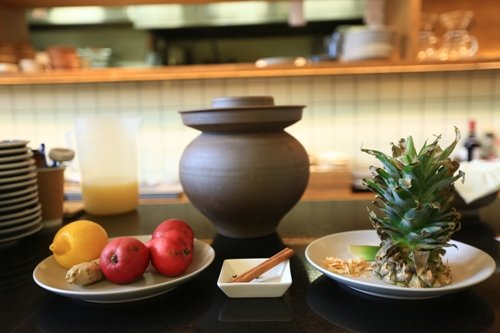
At Tribe Trowbridge is tinkering with a variety of kombucha recipes with different flavors (some of which will be permanent additions to the restaurant’s fusion menu, with others being seasonal offerings). He’s especially proud of his pear and ginger twist on the beverage, featuring cinnamon and cloves, which he hopes will “come out tasting like cider.” Trowbridge is also excited about a version with coconut water, in part because of all the hurdles he encountered while trying to perfect it.
“At first I put dried coconut chips in it, which normally tastes delicious, I eat them by the handful. Unfortunately, they only made the kombucha taste like shampoo, far too tropical,” he says with a chuckle, before adding that it tasted far better when he instead used natural coconut water as the key ingredient.
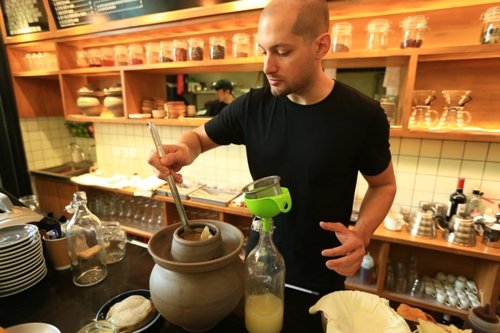
The preparation of kombucha involves several other steps that can be tricky for newbies. Trowbridge makes his own by combining sweet tea and “baby SCOBYS” (an acronym for symbiotic colony of bacteria and yeast, which can be purchased at several Western markets in Beijing). He pours these two chief ingredients into ceramic jars, which he says is the ideal container, by far, for the fermentation process. These jars can be found around Tribe’s ground floor, and each sports a unique hand written label describing Trowbridge’s latest kombucha experiment.
“You’ll want to use a ceramic jar because lot of bad bacteria can grow in glass jars if light hits them, and plastic containers leach chemicals,” he says, adding that only a specific type of ceramic jar will do in this instance: “You have to use an unglazed ceramic jar, because the glazed version has lead in it that will leach into your kombucha.” He adds that glass jars are a perfectly fine substitute, as long as they are kept out of the sun.
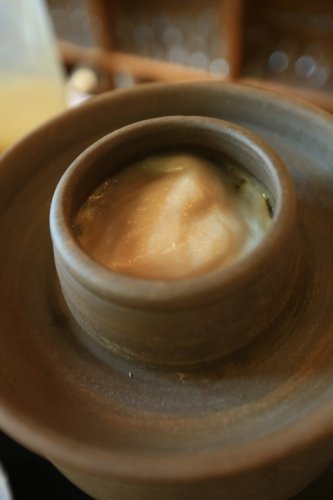
From there, he seals the jar and lets it sit and ferment at room temperature (preferably in a cabinet, out of the light) overnight for approximately 12 hours. After that, he readies the kombucha for its secondary fermentation process. This step involves opening the jar and adding extra ingredients for flavoring purposes – typically chucks of fruit or splashes of juice.
“I prefer to use juice and strain it, because I like that texture more, but it’s really your preference,” Trowbridge says, adding: “If you have pulp in there it certainly won’t hurt, but if you don’t strain it out it will coagulate, and some people find it looks unappealing.”
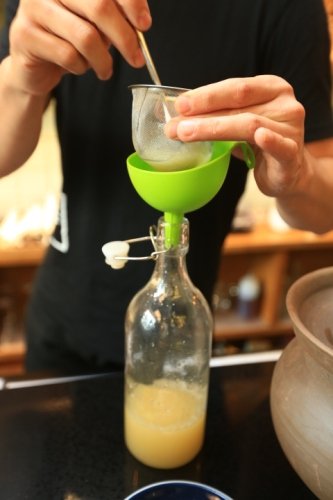
He then pours the kombucha into a glass jar and seals it with a cloth covering and a rubber band (which lets it breathe while also keeping pesky flies out, who are often drawn to the beverage’s sugar). The kombucha can sit after that and ferment for ten days or even up to two weeks, depending on one’s preference. Trowbridge says: “The SCOBY eats sugar, so the longer you let it ferment, the less sweet it will be.”
According to Eric and Jessica Child's book Kombucha!: The Amazing Probiotic Tea that Cleanses, Heals, Energises and Detoxifies, the kombucha’s “microbes are doing some of the work digesting the food for you,” and Trowbridge adds that the beverage also “has all the vitamins and antioxidants that tea has, along with prebiotic and probiotic microbes.”
In addition to its digestive benefits kombucha alleviates joint pain, because it: “… increases synovial hyaluronic acid production … (which) maintains tissue structure, moisture, lubrication and flexibility …” Drunken as a tea, it can also "energize and boost metabolism, (and) it automatically fosters the health of the immune system,” and even helps break down Vitamin B, allowing the body to flush out excess estrogen, which helps reduce PMS symptoms.”
But for Trowbridge, kombucha alleviated a different sort of midsection discomfort. “I suffer from acid reflux – especially when I drink alcohol or coffee. I used to take prescription drugs for it, but I was able to get off those after I started to drink komboucha regularly. Now I can enjoy a glass of wine, and as long as I behave myself and don’t drink too much, I’ll be okay.”

About the author: A ravenous foodie and frequent tbj contributor, Kyle Mullin has been working as a freelance reporter in Beijing since 2011.
Photos: Ken Liu

